Featured Posts

- Index of Psychological Studies of Presidents and Other Leaders Conducted at the Unit for the Study of Personality in Politics
- The Personality Profile of U.S. Supreme Court Associate Justice Brett Kavanaugh
- The Leadership Style of North Korean Leader Kim Jong-un
- North Korea Threat Assessment: The Psychological Profile of Kim Jong-un
- Russia Threat Assessment: Psychological Profile of Vladimir Putin
- The Personality Profile of 2016 Republican Presidential Candidate Donald Trump
- Donald Trump's Narcissism Is Not the Main Issue
- New Website on the Psychology of Politics
- Unit for the Study of Personality in Politics --- 'Media Tipsheet'
categories

- Afghanistan (228)
- Al Gore (2)
- Amy Klobuchar (4)
- Ayman al-Zawahiri (7)
- Barack Obama (60)
- Ben Carson (2)
- Bernie Sanders (7)
- Beto O'Rourke (3)
- Bill Clinton (4)
- Bob Dole (2)
- Campaign log (109)
- Chris Christie (2)
- Chuck Hagel (7)
- Criminal profiles (8)
- Dick Cheney (11)
- Domestic resistance movements (21)
- Donald Trump (31)
- Economy (33)
- Elizabeth Warren (4)
- Environment (24)
- George H. W. Bush (1)
- George W. Bush (21)
- Hillary Clinton (9)
- Immigration (39)
- Iran (43)
- Iraq (258)
- Jeb Bush (3)
- Joe Biden (13)
- John Edwards (2)
- John Kasich (2)
- John Kerry (1)
- John McCain (7)
- Kamala Harris (5)
- Kim Jong-il (3)
- Kim Jong-un (11)
- Law enforcement (25)
- Libya (18)
- Mahmoud Ahmadinejad (6)
- Marco Rubio (2)
- Michael Bloomberg (1)
- Michele Bachmann (173)
- Mike Pence (3)
- Military casualties (234)
- Missing person cases (37)
- Mitt Romney (13)
- Muqtada al-Sadr (10)
- Muslim Brotherhood (6)
- National security (16)
- Nelson Mandela (4)
- News (5)
- North Korea (36)
- Osama bin Laden (19)
- Pakistan (49)
- Personal log (25)
- Pete Buttigieg (4)
- Presidential candidates (19)
- Religious persecution (11)
- Rick Perry (3)
- Rick Santorum (2)
- Robert Mugabe (2)
- Rudy Giuliani (4)
- Russia (7)
- Sarah Palin (7)
- Scott Walker (2)
- Somalia (20)
- Supreme Court (4)
- Syria (5)
- Ted Cruz (4)
- Terrorism (65)
- Tim Pawlenty (8)
- Tom Horner (14)
- Tributes (40)
- Uncategorized (50)
- Vladimir Putin (4)
- Xi Jinping (2)
- Yemen (24)
Links

archives

- November 2021
- January 2021
- November 2020
- October 2020
- September 2020
- August 2020
- July 2020
- April 2020
- March 2020
- February 2020
- January 2020
- December 2019
- October 2019
- July 2019
- May 2019
- April 2019
- March 2019
- February 2019
- January 2019
- December 2018
- September 2018
- August 2018
- July 2018
- June 2018
- April 2018
- March 2018
- February 2018
- January 2018
- August 2017
- July 2017
- June 2017
- May 2017
- April 2017
- February 2017
- January 2017
- December 2016
- November 2016
- October 2016
- September 2016
- August 2016
- July 2016
- June 2016
- May 2016
- April 2016
- March 2016
- February 2016
- January 2016
- December 2015
- November 2015
- October 2015
- September 2015
- August 2015
- July 2015
- June 2015
- May 2015
- April 2015
- March 2015
- February 2015
- January 2015
- December 2014
- November 2014
- October 2014
- September 2014
- August 2014
- July 2014
- June 2014
- May 2014
- April 2014
- March 2014
- February 2014
- January 2014
- December 2013
- November 2013
- October 2013
- September 2013
- August 2013
- July 2013
- June 2013
- May 2013
- April 2013
- March 2013
- February 2013
- January 2013
- December 2012
- November 2012
- October 2012
- September 2012
- August 2012
- July 2012
- June 2012
- May 2012
- April 2012
- March 2012
- February 2012
- January 2012
- December 2011
- November 2011
- October 2011
- September 2011
- August 2011
- July 2011
- June 2011
- May 2011
- April 2011
- March 2011
- February 2011
- January 2011
- December 2010
- November 2010
- October 2010
- September 2010
- August 2010
- July 2010
- June 2010
- May 2010
- April 2010
- March 2010
- February 2010
- January 2010
- December 2009
- November 2009
- October 2009
- September 2009
- August 2009
- July 2009
- June 2009
- May 2009
- April 2009
- March 2009
- February 2009
- January 2009
- December 2008
- November 2008
- October 2008
- September 2008
- August 2008
- July 2008
meta

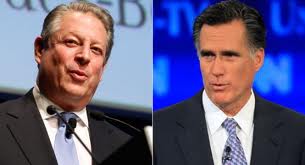
Photo composite: The Moderate Voice
Mitt Romney’s Al Gore Problem

By Dana Milbank
Opinion Writer
![]()
January 13, 2012
Following Mitt Romney on the campaign trail is a painful yet familiar experience.
Painful, because of the wince-inducing moments when you realize that, for all of Romney’s success in imitating human attributes, there remain glitches in the matrix that reveal him to be different from the rest of us.
In the past few days alone, he claimed to take pleasure in firing people, expressed his phony fears about getting a “pink slip†from the job that swelled his wealth to nearly a quarter-billion dollars and asserted misleadingly that he worked an “entry-level†job after Harvard Business School.
Romney further alleged that “I never thought I’d get involved in politics†— though he has been in politics for two decades. And he claimed that he didn’t seek reelection as Massachusetts governor because “that would be about me†— as if running for president, which he did instead, was a gesture of sacrifice and altruism.
Romney, the conservative writer Jonah Goldberg argued this week, has an “authentic inauthenticity problem.†And that is precisely why his struggle is so familiar. He is the political reincarnation of Al Gore, whose campaign I covered with an equal amount of cringing a dozen years ago.
To see Romney, in his Gap jeans, laughing awkwardly at his own jokes and making patently disingenuous claims, brings back all those bad memories of 2000: “Love Story.†Inventing the Internet. Earth tones. Three-button suits. The alpha male in cowboy boots. The iced-tea defense. The Buddhist temple. The sighing during the debate.
It’s familiar, as well, to Michael Feldman, a longtime Gore aide who watched his boss get undone by the inauthentic label. “When an impression like that hardens, you’re communicating into a stiff wind,†he told me. “These caricatures can form impressions that are really hard to turn around.â€
If anything, Romney’s problem is greater than Gore’s because it is rooted in his frequent repositioning on issues such as abortion, gay marriage and health care. In substance, Romney’s troubles may turn out to be closer to John Kerry’s: As my colleague Greg Sargent has written, the undermining of Romney’s business acumen by the attacks on his work at Bain Capital is similar to the undoing of Kerry’s record as a Vietnam War hero by the Swift Boat Veterans for Truth. …
But in temperament and style, Romney is closest to Gore, another politician’s son from Harvard with pedantic tendencies who, in public, never quite seems comfortable.
The media tend to assign each candidate a character flaw as a form of shorthand (John McCain was volatile, George W. Bush was dopey, Obama is all talk). Ominously, Romney’s descriptions are the same applied to Gore 12 years ago: assuming “personas,†going through “makeovers,†attempting “regular-guy†traits, exhibiting “robotic†behavior and issuing new versions, such as “Romney 3.0.â€
For Romney, the problem now becomes that reporters, and opponents, are perpetually on the lookout for new examples to add to his dossier of awkwardness. “It’s a self-perpetuating cycle,†explained Chris Lehane, who sought, with limited success, to help Gore defy his “wooden†image. “You’re trying so hard to think through what you’re going to say that you get mental handcuffs every time you speak. You’re so nervous about the archetype that you fall into the archetype.â€
In Romney’s case, there is already abundant support for the archetype: his belief that “corporations are people,†his talk about hunting “small varmints,†the story about driving with the family dog in a kennel strapped atop the Romneys’ car, his attempted $10,000 bet with Rick Perry, his singing “Who let the dogs out?,†his pretending to be pinched on the behind by a waitress, his bizarre jokes about Hooters and hollandaise sauce, and his tendency to ask debate moderators for protection from his opponents.
None of those is, by itself, disqualifying — and, as in Gore’s case, not all the examples are fair. But, combined with Romney’s frequent fluctuations on the issues, his awkwardness has left an impression that he is a phony and not to be trusted. Romney isn’t necessarily doomed — Gore, after all, received more votes than the other guy — but this much seems clear: Over the next 10 months, Romney will be getting the Gore treatment.
Full story and reader comments at the Washington Post
——————————
Commentary
 Dana Milbank’s opinion of Mitt Romney’s personological shortcomings as a presidential candidate is the most insightful I’ve seen in the mainstream media. As I wrote elsewhere in this blog on Aug. 9, 2011, Mitt Romney — despite being the early front-runner in public opinion polls — is unlikely to be the Republican presidential nominee but, if he is, will not emerge as a viable challenger to Barack Obama.
Dana Milbank’s opinion of Mitt Romney’s personological shortcomings as a presidential candidate is the most insightful I’ve seen in the mainstream media. As I wrote elsewhere in this blog on Aug. 9, 2011, Mitt Romney — despite being the early front-runner in public opinion polls — is unlikely to be the Republican presidential nominee but, if he is, will not emerge as a viable challenger to Barack Obama.
As I noted last summer, Romney’s score of 6 on the Personal Electability Index (which has accurately predicted the outcome of every presidential election since 1996), ranks near the bottom among presidential candidates I’ve studied in the past four presidential election cycles. Compared with the two recent presidential candidates that in Milbank’s opinion most closely resemble Romney, Romney’s PEI score is marginally worse than John Kerry’s lackluster score of 9, though considerably better than Al Gore’s record-low score of -17.
Following are the PEI scores of some of the presidential candidates referenced by Milbank.
Mitt Romney: PEI = 6
Scale: 1A 1B 2 3 4 5A 5B 6 7 8 9 0
Score: 7 4 5 2 4 0 3 12 1 0 4 4
Romney: [Extraversion (scale 3) = 2] + [Narcissism (scale 2) = 5] + [Dominance (scale 1) = 7] – [Introversion (scale 8) = 0] – [Conscientiousness (scale 6) = (12 – 4)] = 6
Al Gore: PEI = –17
Scale: 1A 1B 2 3 4 5A 5B 6 7 8 9 0
Score: 8 2 3 1 4 1 3 22 5 11 12 0
Gore: [Extraversion (scale 3) = 1] + [Narcissism (scale 2) = 3] + [Dominance (scale 1) = 8] – [Introversion (scale 8) = 11] – [Conscientiousness (scale 6) = (22 – 4)] = –17
John Kerry: PEI = 9
Scale: 1A 1B 2 3 4 5A 5B 6 7 8 9 0
Score: 6 6 7 0 3 0 3 5 2 3 0 0
Kerry: [Extraversion (scale 3) = 0] + [Narcissism (scale 2) = 7] + [Dominance (scale 1) = 6] – [Introversion (scale 8) = 3] – [Conscientiousness (scale 6) = (5 – 4)] = 9
George W. Bush: PEI = 31
Scale: 1A 1B 2 3 4 5A 5B 6 7 8 9 0
Score: 11 5 4 16 4 0 0 2 0 0 0 4
Bush: [Extraversion (scale 3) = (16 – 1)] + [Narcissism (scale 2) = 5] + [Dominance (scale 1) = 11] – [Introversion (scale 8) = 0] – [Conscientiousness (scale 6) = (2 – 2)] = 30
Barack Obama: PEI = 28
Scale: 1A 1B 2 3 4 5A 5B 6 7 8 9 0
Score: 10 6 11 9 7 1 2 5 4 1 0 4
Obama: [Extraversion (scale 3) = 9] + [Narcissism (scale 2) = 11] + [Dominance (scale 1) = 10] – [Introversion (scale 8) = 1] – [Conscientiousness (scale 6) = (5 – 4)] = 28
Personality patterns: dimensional continuum of personality types
1A Dominant: Asserting–Controlling–Aggressive (Sadistic)
1B Dauntless: Adventurous–Dissenting–Aggrandizing (Antisocial)
2 Ambitious: Confident–Self-serving–Exploitative (Narcissistic)
3 Outgoing: Congenial–Gregarious–Impulsive (Histrionic)
4 Accommodating: Cooperative–Agreeable–Submissive (Dependent)
5A Aggrieved: Unpresuming–Self-denying–Self-defeating (Masochistic)
5B Contentious: Resolute–Oppositional–Negativistic (Passive aggressive)
6 Conscientious: Respectful–Dutiful–Compulsive (Obsessive compulsive)
7 Reticent: Circumspect–Inhibited–Withdrawn (Avoidant)
8 Retiring: Reserved–Aloof–Solitary (Schizoid)
———————————————————————————————————————
Analysis of Al Gore’s personal deficits as a presidential candidate
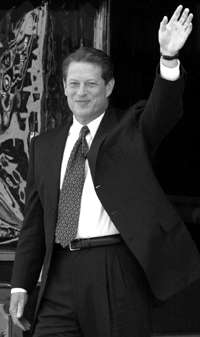
Why Gore won’t win
(Aubrey Immelman, St. Cloud Times, July 9, 2000, p. 9B)
Summary: Time and again in recent electoral history the presidential candidate with the most charisma routinely has emerged the winner. Al Gore’s storied stiffness, wooden demeanor, and lack of charisma eclipse his positive attributes as a candidate. A study of his political personality reveals a dutiful, conscientiousness character infused with the distinctly aloof demeanor of an introvert. The characteristically solemn mood of conscientious personalities is conveyed in an unrelaxed, tense demeanor associated with tight emotional control. Not surprisingly, Gore is publicly perceived as stiff and formal. His stiffness reflects his conscientiousness, while his wooden demeanor reveals his introversion. For Gore to become a viable contender, he should lose the self-effacing jokes and concentrate instead on conveying a clear, unadulterated message about who he is and what he stands for. Instead of trying to overcome his stiffness with a counterfeit, “connect with people†leadership style, he should capitalize on his stiffness as concrete evidence, so to speak, of his fundamental integrity. He should play up his introversion as an asset that will serve him well, enabling him to focus on the business of leadership unencumbered by the burdens of bonding with constituents and falling prey to polls.
Personality may overpower pundits, polls in this election
(Aubrey Immelman, St. Cloud Times, Oct. 1, 2000, p. 9B)
Summary: Time and again since the first televised presidential debates in 1960, with the exception of Richard Nixon in 1968 and 1972, the presidential candidate with the greatest personal charisma and publicly perceived warmth or likability has won the race. The personal dimension in politics is an emerging, pivotal predictor of presidential election outcomes at the turn of the century. A critical determinant of whether people form positive or negative personal impressions hinges on their perception of others as warm and outgoing vs. cold and retiring. Al Gore is the prototype of the presidential candidate who fails to ignite the public’s passion in an era of “made-for-television” elections: the conscientious introvert — a character type that has not occupied the Oval Office since Jimmy Carter, and before him Herbert Hoover, Calvin Coolidge, and Woodrow Wilson.
Will Gore’s little lies be big turnoff for voters?
(Aubrey Immelman, St. Cloud Times, October 22, 2000, p. 9B)
Summary: Careful scrutiny of Al Gore’s penchant for hyperbole and his tendency to garnish the truth with self-serving affectations permits a more nuanced perspective: Gore’s embellishments are driven by a confluence of conscientious and introverted personality patterns that constitutes a recipe for haplessness in retail presidential politics. Conscientious personalities dread disapproval, with a corresponding tendency to overvalue aspects of themselves that signify perfectionism, moral rectitude, and diligence. Few things give them greater satisfaction than showcasing their virtues and convincing others that they are right. Perhaps unfairly, but not surprisingly, others regard such conduct as self-righteous, moralistic, overbearing, and condescending. But Gore’s overconscientiousness fails to fully account for his political ineptitude and lack of social graces. Enter the strong introversive streak that permeates and colors Gore’s conscientiousness. Deeply introverted personalities frequently fail to respond appropriately to social cues, which gives rise to interpersonal awkwardness and difficulty in social communication. They are restricted in the ability to perceive emotional meaning or express feelings in social settings, and their social communications sometimes are convoluted, obscure, and abstruse.
Theories on candidate personality pan out
(Aubrey Immelman, St. Cloud Times, Dec. 10, 2000, p. 11B)
Summary: Al Gore, though diligent and dutiful, is inclined to be stubborn and moralistic — a classic conscientious type. When combined with considerable aloofness, the less endearing aspects of the conscientious character can compound the candidate’s public relations problems. Introverts like Gore are not particularly warm or engaging, and their lack of social graces may be perceived as social indifference and a lack of empathy, which tends to elicit a reciprocal reaction in voters.
———————————————
Related research papers
The Political Personality of U.S. Vice President Al Gore. Paper presented by Aubrey Immelman at the 21st Annual Scientific Meeting of the International Society of Political Psychology, Montréal, Québec, Canada, July 12–15, 1998. Abstract and link for full-text (28 pages; PDF) download at Digital Commons: http://digitalcommons.csbsju.edu/psychology_pubs/37/
The Political Personalities of 2000 U.S. Presidential Candidates George W. Bush and Al Gore. Paper presented by Aubrey Immelman at the 23rd Annual Scientific Meeting of the International Society of Political Psychology, Seattle, WA, July 1–4, 2000. Abstract and link for full-text (49 pages; PDF) download at Digital Commons: http://digitalcommons.csbsju.edu/psychology_pubs/35/
The Political Personality of 2012 Republican Presidential Candidate Mitt Romney. Paper presented by Aubrey Immelman at the 35th Annual Scientific Meeting of the International Society of Political Psychology, Chicago, July 6–9, 2012. Abstract and link for full-text (35 pages; PDF) download at Digital Commons: http://digitalcommons.csbsju.edu/psychology_pubs/98/
————————————————————————————————
Election 2008: Psychological analysis of Mitt Romney
Dutiful Romney Continues Struggle for Votes
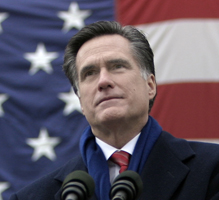
By Mick Lundstrum and Aubrey Immelman
Unit for the Study of Personality in Politics
January 11, 2008
Mitt Romney, the presidential candidate better known for his Mormon faith than for his policy positions, has been dogged by obstacles and setbacks on the campaign trail. In Iowa, where he had dumped nearly three-fifths of his campaign expenditure, he was blindsided by the come-from-nowhere Huckabee juggernaut. In New Hampshire, he was bested by a resuscitated back-from-the-dead McCain campaign.
By all appearances, Gov. Romney is an attractive candidate. He looks “presidential,†is well financed, and has a strong track record in business and government. Yet, despite an MBA and law degree from Harvard, a successful business career as management consultant and venture capitalist, president and CEO of the 2002 Salt Lake Winter Olympics Organizing Committee, governor of Massachusetts, and chair of the Republican Governors’ Association, Romney has found little traction with Republican voters.
So, how do we account for Romney’s floundering campaign for Republican support?
Some have pointed to Romney’s Mormon beliefs, viewed with suspicion by elements of the Christian Evangelical Republican base. Others have pointed to his “flip-flop†on abortion. Another consideration, which has not received much air time in the media or in print, is Romney’s personality — those aspects of his typical modes of thinking, acting, and relating to others that remain relatively consistent over time and across situations.
For insight into this aspect Romney’s character, we generated a personality profile using a standard assessment procedure developed at the Unit for the Study of Personality in Politics at the College of St. Benedict and St. John’s University in Minnesota. This is what we found.
Conscientious
Perhaps not surprising for someone with Romney’s academic and professional credentials, he emerged from the assessment as a highly conscientiousness personality. What is remarkable, however, is that few candidates for president can claim conscientiousness as a prominent trait — in the past several elections cycles, an exclusive club of losing candidates consisting of Michael Dukakis, Bob Dole, Steve Forbes, Bill Bradley, and Al Gore.
People with Romney’s levels of conscientiousness are best described as “dutiful.†They are characteristically proper and dignified, dependable, and principled (though the latter trait is somewhat at variance with perceptions of Romney as a flip-flopper).
Above all, they are highly organized, which accounts for Romney’s roaring success in organizational and corporate management and financial restructuring. Dutiful and diligent, and adept at getting the job done without letting work accumulate, conscientious leaders are movers and shakers who are at the top of their game when making and implementing policy.
On the downside, conscientious persons can be rigid thinkers with a closed-minded tendency; as leaders, they are technocratic rather than visionary. For that reason, in high political office they may be better suited to the role of assistant to the chief executive — perhaps as vice president, cabinet secretary, or chief of staff.
With their attention to detail, their work ethic, and their prudence, conscientious persons are potentially good leaders; however, in the United States they usually have trouble attaining high-level political office, because of the difficulty they have connecting with voters and the media.
Dominant
Like many politicians who strive for higher political office, Romney also has a pronounced dominant tendency — though not nearly as pervasive as the aggressive dominance of a Rudy Giuliani or the self-assertive boldness of a John McCain. Instead, it would be more accurate to describe Romney as merely assertive, strong-willed, and goal-directed.
Some aspects of Romney’s dominance reinforce his fundamental conscientious tendency — most notably his strong work ethic, proneness to cognitive inflexibility, and obstinacy, which suggests he may stay in the race longer than he remains a viable candidate. That said, leaders like Romney, with moderate levels of conscientiousness and dominance, generally are effective, deliberative leaders who make informed decisions and get things done.
In terms of his experience and psychological profile, Romney may be one of the better candidates for president, but as recent presidential election history has shown, he does not fit the profile of a successful presidential candidate.
Next Tuesday’s Republican primary in Michigan — where native son Mitt Romney has the rare advantage of contesting an early-primary state where his father once served as governor — will be the acid test for whether that particular chapter in U.S. election history repeats itself.
Note: A slightly revised version of this article was published as the “Your Turn” column Romney is conscientious and assertive in the St. Cloud Times (p. 5B), Jan. 15, 2008.
————————————————————————————————
Election 2012: Psychological analysis of Mitt Romney
Newsweek cover story: Mitt Romney is too ‘conscientious,’ quality may cost him election

Mitt Romney (Photo credit: Scott G. Winterton / Deseret News archives)
By Hal Boyd
Deseret News
September 26, 2011
Newsweek’s cover story on former Massachusetts’s Gov. Mitt Romney says the GOP presidential hopeful has one problem: he’s too “conscientious.”
“In fact,” the article’s author, Andrew Romano, writes, “it is the only trait of (Romney’s) that qualifies as clinically ‘prominent.'”
Romano’s assessment is based on research performed by Aubrey Immelman of St. John’s University in Collegeville, Minn., an expert on the electoral effects of candidates’ personalities.
Immelman performs studies … “[yielding] the Personal Electability Index (PEI) … candidates with low PEI scores almost never get elected. Romney’s score is a six, which is abysmal. Barack Obama, by comparison, earned a 28, and even failed candidates such as Hillary Clinton and John McCain have cleared 20 (23 and 26, respectively).”
The reason for Romney’s low score, according to Immelman: today’s electorate rejects candidates who are considered “conscientious” or in other words “proper, diligent, detail-oriented and super-rational.”
According to the piece this wasn’t always the case — “Herbert Hoover, Calvin Coolidge, Woodrow Wilson, and even James Madison won the White House because (not in spite) of their most Romneyesque qualities: politeness, caution, restraint, systematic thinking, a sense of duty and so on,” writes Romano. “But while earlier eras rewarded calculation — until the mid–20th century, public persuasion mattered less than methodical behind-the-scenes maneuvering — the 24/7 news cycle forces candidates to connect.”
Romney’s campaign has been striving hard to make Romney more palatable to modern-day voters. Stuart Stevens, “the man in charge of reshaping Mitt Romney’s image,” according to a NY Times profile of Stevens, he has by most accounts been doing a decent job.
“Mr. Stevens has brought to the Romney team a laid-back, hang-loose, though intense, vibe,” writes Ashley Parker in her profile of Stevens in the Times. “… Whereas Mr. Romney is a linear thinker who tends to home in on the details, Mr. Stevens is a creative, big-picture person who tries to focus on winning the election rather than simply winning the day.” …
Though “In a small group setting, particularly among similarly educated, successful individuals, he can charm and impress with (his) intellectual rigor,” Romney’s fellow colleague at Bain, Marc Wolpow, told Newsweek. “His challenge is that there are 300 million people in America. He seems to connect naturally with only a small handful of them.” Only time will tell if he can win over the others.
————————————————
Related reports on this site
Why Mitt Romney Won’t Win (May 12, 2011)

Excerpt: Research conducted at the Unit for the Study of Personality in Politics under the direction of Aubrey Immelman, Ph.D., suggests that Massachusetts’ health law, enacted during Romney’s tenure as governor, may be the least of his problems as he vies for the Republican nomination in a crowded GOP field. Romney lacks the personal charisma to sway non-base voters, as measured by the Personal Electability Index for presidential contenders, developed at the Minnesota-based political psychology research unit.
Mitt Romney Personality Profile (June 2, 2011)
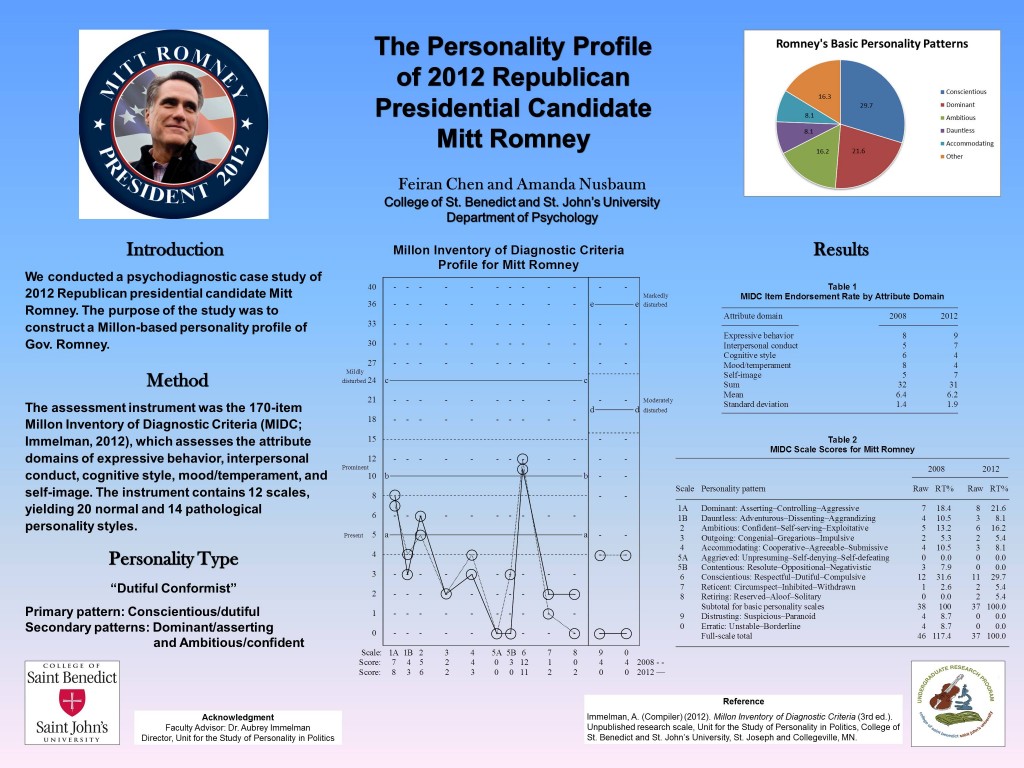
Click on image for larger view
Excerpt: A psychological analysis of former Massachusetts governor Mitt Romney, conducted in fall 2007 by Julie Seifert, Mick Lundstrum, and Aubrey Immelman, Ph.D., at the Unit for the Study of Personality in Politics revealed that Romney’s primary personality pattern is Conscientious/dutiful, with secondary features of the Dominant/asserting and Ambitious/confident patterns.
Obama Campaign Tilting at Romney Windmill (Aug. 9, 2011)
Excerpt: The Obama campaign would be misguided if it diverted inordinate resources to fending off Mitt Romney as Barack Obama’s likely opponent. Despite being the early front-runner in public opinion polls, Romney is unlikely to be the Republican presidential nominee — or, if he is, to be a viable challenger to Barack Obama. … Specifically, Romney’s score of 6 on the Personal Electability Index (PEI), which has accurately predicted the outcome of every presidential election since 1996, ranks near the bottom among presidential candidates I’ve studied in the past four presidential election cycles — slightly lower than John Kerry’s PEI score of 9 (though considerably better than Al Gore’s -17).
Mitt Romney’s Leadership Style (Sept. 3, 2012)

Click on image for larger display
Excerpt: A psychological profile of former Massachusetts governor Mitt Romney, developed at the Unit for the Study of Personality in Politics during Romney’s 2008 and 2012 presidential campaigns, reveals that the Republican nominee is highly conscientious, with a personality type best described as a “dutiful conformist.” Specifically, Romney is primarily a Conscientious-dutiful personality, complemented by secondary Dominant-asserting, Ambitious-confident, and Accommodating-cooperative features and a minor Retiring-reserved tendency. Romney’s personality profile provides a stable framework for anticipating his likely leadership style as president, as outlined in this report of how Romney will govern, if elected.
Why Mitt Romney Won’t Be President — In Theory (Oct. 29, 2012)

Aubrey Immelman and Andrew Obritsch in Chicago at the annual scientific meeting of the International Society of Political Psychology to present their research on Barack Obama and Mitt Romney, July 2012.
Excerpt: A heuristic model developed at the Unit for the Study of Personality in Politics to predict the winner of the presidential election prior to Super Tuesday indicates that Democratic incumbent President Barack Obama will defeat Republican challenger Gov. Mitt Romney in the November 6, 2012 U.S. presidential election.
—————————
Related report
Mitt Romney: The GOP’s own John Kerry, or is he more an Al Gore?
(By Michelle Cottle, The Daily Beast, Jan. 14, 2012)

Photo credit: John Kerry windsurfing — AP; Mitt Romney — Getty Images; Composite — The Daily Beast.
Excerpt: Even within Kerry’s and Romney’s core similarities lie key differences. While both men are famously awkward and terrible at glad-handing, Romney is far more reminiscent of Al Gore than of Kerry. Kerry, like so many of his Senate brethren, is your garden-variety bore. … Watching Romney, by contrast, prompts flashbacks to Al the Cyborg Gore. It’s not that the governor is dull. Rather, it’s that he somehow manages to come across as simultaneously stiff and slick, and jarringly ill at ease with any attempt at casual banter. The timing of his jokes is off, his smiles lack warmth, and his laughter doesn’t convey mirth so much as careful programming by a consultant. … Full story
——————————
2/9/2012 Update
Mitt Romney and the Enthusiasm Gap

Republican presidential candidate and former Massachusetts governor Mitt Romney speaks at a campaign rally in Grand Junction, Colo., Monday, Feb. 6, 2012 — one day before the Colorado caucuses. (Photo credit: Gerald Herbert / AP via Washington Post photo gallery Mitt Romney’s Second Run)

By Dan Balz
The Take
![]()
February 8, 2012
Excerpts
In the aftermath of Rick Santorum’s clean sweep of Colorado, Minnesota and Missouri, Mitt Romney is still, in fact, the front-runner for the Republican presidential nomination. But the lack of enthusiasm for his candidacy among conservatives foreshadows a potentially ugly road ahead to the party’s convention in Tampa and general-election problems if he becomes the nominee. …
The issue is not whether Romney has been significantly derailed from his path to the nomination, but rather what kind of nominee he might be and what kind of party would be behind him. …
On Tuesday, turnout was below the levels in 2008. Republicans are fervent in their desire to defeat the president in November but can’t work up much enthusiasm for their candidates. …
Can he [Romney] find a positive vision that will energize his base and strike a chord in a general election? …
———————————
2/18/2012 Update
Can Romney Find a Way to Connect with GOP Voters?

Republican presidential candidate and former Massachusetts governor Mitt Romney speaks at a campaign rally in Mesa, Ariz., Feb. 13, 2012. (Photo credit: Gerald Herbert / AP via The Washington Post — View photo gallery)
By Karen Tumulty and Philip Rucker
![]()
February 18, 2012
Excerpts
MAYFIELD HEIGHTS, Ohio — To listen to Mitt Romney these days is to wish at times that someone would give him back his PowerPoint.
Romney, after all, made a fortune on his ability to make a crisp presentation and close a deal. As a governor pushing for a landmark approach to health-care coverage in Massachusetts, the former management consultant won over doubters by putting together a slide presentation and taking it all over the state.
So why is he having so much trouble making the sale with the Republican electorate?
Many of his allies and supporters are increasingly worried that the problem is Romney himself.
Until now, Romney and his well-financed allies have been able to dispatch any opponent who presents a threat by drowning the potential usurper with negative advertising.
But the fact that a new one emerges each time he vanquishes another betrays the existence of a deeper discontent with Romney himself. …
As Romney has adjusted tactically to a primary battle that is turning out to be tougher than he bargained for, some of his backers now say they fear that Romney is reinforcing the doubts that voters already have about him. …
One fundraiser, who did not want to be identified publicly criticizing a candidate in whom he invested, said Romney’s difficulty is connecting with people. …
An adviser, also speaking on the condition of anonymity, said he wished Romney would become more inspirational and less technocratic. …
Before business-oriented audiences, Romney seems at ease, focused and assured, a man who knows he is talking a language his listeners understand. …
But when he takes the stage at large rallies without a teleprompter, Romney veers from bromides about America’s greatness (“I love America. I love its beauty. This is a beautiful state, too. I love this state.â€) to odd facts about his upbringing (“My dad was a lathe and plaster carpenter, like a drywall carpenter. He could take a handful of nails, stick them in his mouth and spit the nails out pointy end forward.â€) to broad indictments of Obama (“The president is slowly but surely turning us into a European-style welfare state. This is not the America we’ve known.â€).
Romney’s word choices — such as his recent declaration that he had been a “severely conservative†governor — can grate on the very people he is trying to win over. …
———————————
3/26/2012 Update

By Chris Cillizza
The Fix
![]()
March 25, 2012
Excerpt
[Mitt] Romney is no world-beater as a candidate. He is awkward and somewhat tin-eared, and can seem aloof [emphasis added]. And yet, when you scan the hurdles — demographic and ideological — that Romney has overcome to emerge as the all-but-certain Republican nominee, it’s clear that he doesn’t get enough credit for what he’s accomplished. …
—————
Compare the above characterization of Mitt Romney as awkward and tin-eared, by Chris Cillizza, with an earlier assessment of Al Gore, by researchers at the Unit for the Study of Personality in Politics, as socially awkward and having a politically tone-deaf tin ear.
—————
Bradley Seems More Accommodating Than His Rival
By Katie Conlin and Kara Hansen
(with Aubrey Immelman)
Unit for the Study of Personality in Politics
St. Cloud Times
January 16, 2000
Excerpt
In these solitary, self-disciplined qualities [Bill] Bradley closely resembles Vice President Al Gore; indeed, of all the presidential contenders [in the 2000 election cycle], Bradley and Gore most closely resemble each other in terms of underlying character.
The combination of introverted equanimity and a conscientious, almost compulsive work ethic in Bradley’s personality have produced a focused, goal-directed man who is highly successful at whatever he chooses to do.
Although Gore also possesses these qualities in large measure, his social reserve is more acute, which feeds his social awkwardness and contributes to a tone-deaf political tin ear [emphasis added]. …
——————————
8/9/2012 Update
ABC/WaPo: Romney Favorability Levels Off at Lowest Mark for a Presumptive Nominee

Photo credit: Tolga Akmen / ZUMA Press / Newscom via Talking Points Memo
![]() By Tom Kludt
By Tom Kludt
Talking Points Memo
August 8, 2012
After his personal popularity saw a resurgence almost immediately after he wrapped up the Republican presidential nomination, Mitt Romney’s favorability rating has plateaued at a historically low level, according to a new poll released Wednesday.
According to the latest ABC News/Washington Post poll, 40 percent of Americans hold a favorable view of Romney — virtually identical to the 41 percent high-water mark that his favorability rating reached in the ABC/WaPo survey from late May. Compounding matters for the presumptive Republican nominee: the percentage of the public who view him unfavorably has jumped from 45 percent to 49 percent. Romney’s standing is even lower among independents, with only 37 percent of the bellwether voting bloc viewing him favorably compared with 50 percent who view him unfavorably.
Romney’s 40 percent favorability mark represents the lowest midsummer personal popularity rating for a presumptive presidential nominee dating back to 1948. Perhaps Romney’s only solace is that former President George H.W. Bush nursed a comparable 41 percent favorability rating at a similar point in 1988. Bush, of course, went on to comfortably win the presidential election that year — although he wasn’t facing an incumbent.
The former Massachusetts governor has been plagued by low favorability ratings throughout the 2012 campaign, but it wasn’t long ago when it looked like his personal appeal was recovering. …
The ABC/WaPo poll might serve as an indication that Romney’s favorability rating has reached its ceiling and that the attacks being levied by President Barack Obama’s campaign are beginning to stick. [see comment below] …
————————
Commentary
From a personality-in-politics perspective, the root cause of Mitt Romney’s low favorability ratings is not that “attacks being levied by President Barack Obama’s campaign are beginning to stick.” Although political campaigning and negative advertising may influence a candidate’s favorability at the margins, the real explanation is that favorability is an outcome measure, or index — a dependent variable — with Romney’s underlying personality as perceived by voters being the chief input, or causal, factor — an independent variable. Because personality is temporally stable and cross-situationally consistent, Romney’s Personal Electability Index score will not vary significantly around his low PEI measure 6 and hence, his favorability is unlikely to fluctuate much, irrespective of what he or Obama might say or do in terms of campaigning.
———————————
9/28/2012 Update

Mitt Romney makes a campaign stop on Sept. 27, 2012 at an American Legion post in Springfield, Virginia. (Photo: M. Scott Mahaskey / POLITICO)
By Mike Allen, Jonathan Martin and Jim Vandehei
![]()
September 28, 2012
It isn’t the chair or the ho-hum convention. Or the leaked video. Or Stuart Stevens. Or the improving economy. Or media bias. Or distorted polls. Or the message. Or Mormonism.
It’s Mitt.
With Republicans everywhere wondering what has happened to the Mitt Romney campaign, people who know the candidate personally and professionally offer a simple explanation: It’s the candidate himself.
Slowly and reluctantly, Republicans who love and work for Romney are concluding that for all his gifts as a leader, businessman and role model, he’s just not a good political candidate in this era.
It kills his admirers to say it because they know him to be a far more generous and approachable man than people realize — far from the caricature of him being awkward or distant — and they feel certain he would be a very good president. …
He treats his staff with respect, works hard on his weaknesses and does all of it because he possesses supreme confidence in his capacity to lead effectively.
“He’s a great leader, but he’s not a great politician,†said a top member of Romney’s organization. “As much as we complain about politicians, we like a good politician. He doesn’t have the hand-on-the-shoulder thing. He’s not quick-witted. He’s an analytical, data-driven businessperson.â€
And that’s the problem: His résumé and his personal style seem ill-suited for the moment. He’s a son of privilege who made hundreds of millions in private equity who is running in the first election since the 2008 economic meltdown — a meltdown many blame on rich, Wall Street tycoons. And he’s a socially stiff relic of a pre-ironic America, who struggles with improvisation and personal connections when the constant lens of the Web demands both. …
Campaign officials, in the end, think likability is the least of his issues. The much bigger one is this sense that Romney is not comfortable in his skin, at least the conservative, no-compromise skin he had to put on to win the nomination. …
Romney is cautious by nature, which paid off in business. But in politics, rather than chart a bold course and stick with it, he winds up trimming and dodging in ways that, cumulatively, sink in with voters. …
Romney refers frequently and unabashedly to his late father, George, a former Michigan governor and secretary of Housing and Urban Development who lost the Republican presidential nomination to Nixon in 1968. In interviews, Romney even throws in verbatim recitations of his dad’s business precepts. The tributes are touching but make friends wonder how much of the son’s quest is based on family honor or expectations, rather than the internal fire that animates most winning politicians. …
Leave a Reply
You must be logged in to post a comment.

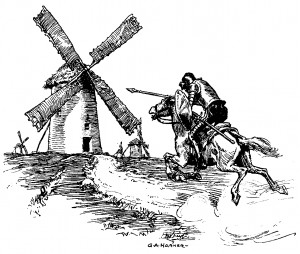

February 18th, 2012 at 9:06 am
[…] Personality Matters: Mitt Romney Has Al Gore Problem (Jan. 16, 2012) […]
March 25th, 2012 at 9:56 am
[…] Personality Matters: Mitt Romney Has Al Gore Problem (Jan. 16, 2012) […]
April 26th, 2012 at 11:27 am
[…] Personality Matters: Mitt Romney Has Al Gore Problem (Jan. 16, 2012) […]
August 30th, 2012 at 3:36 am
[…] Personality Matters: Mitt Romney Has Al Gore Problem (Jan. 16, 2012) […]
August 31st, 2012 at 8:19 am
[…] Personality Matters: Mitt Romney Has Al Gore Problem (Jan. 16, 2012) […]
October 29th, 2012 at 9:20 am
[…] Personality Matters: Mitt Romney Has Al Gore Problem (Jan. 16, 2012) […]
August 23rd, 2015 at 5:02 am
[…] Personality Matters: Mitt Romney Has Al Gore Problem (Jan. 16, 2012) […]
February 29th, 2016 at 8:37 pm
[…] Personality Matters: Mitt Romney Has Al Gore Problem (Jan. 16, 2012) […]
March 24th, 2016 at 5:10 pm
[…] No, Mitt Romney didn’t put it in so many words. The “e-word†was not uttered in his brief Friday-afternoon Facebook post, and Romney doesn’t say he wants Cruz to be president. But the practical effect is the same. […]